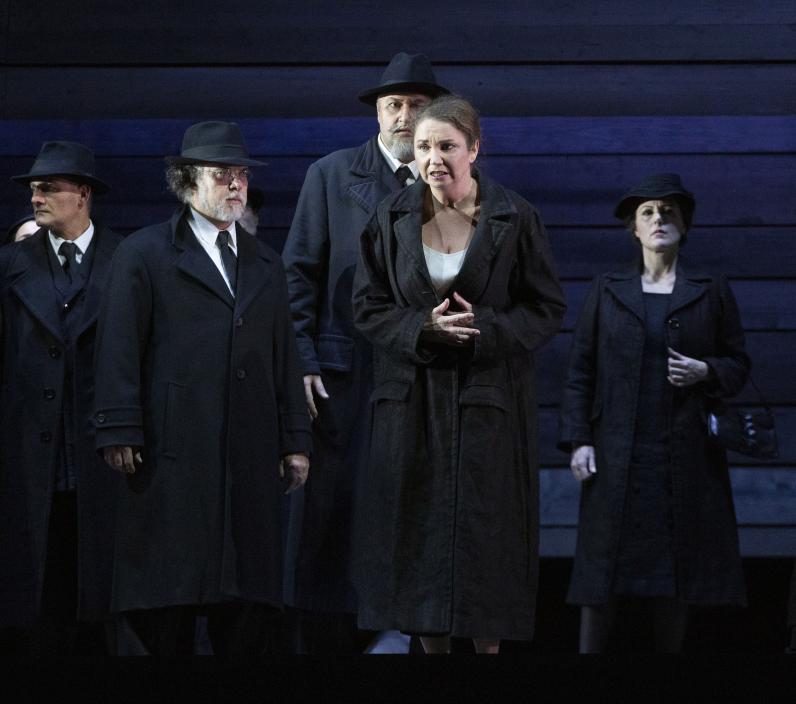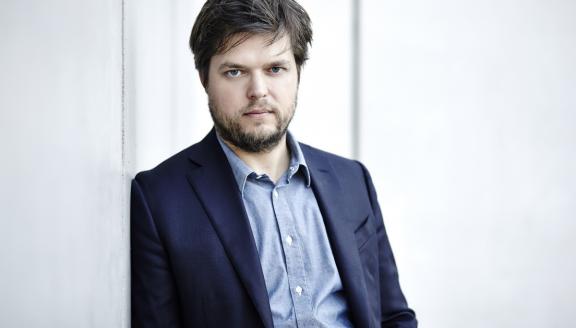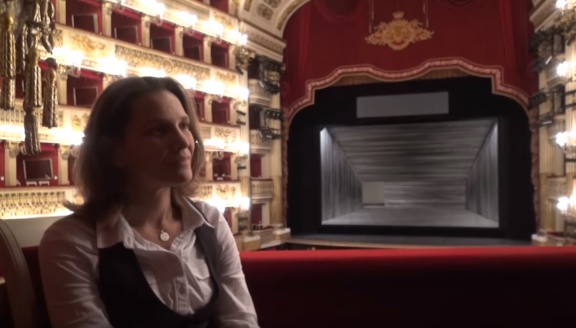

Káťa Kabanová

With her husband away on business, a lonely wife dares to find love outside the home. Racked with guilt, she soon finds that freedom has its price.
Religious moralism, family tensions, alcoholism and suicide are just a few of the elements that make up this powerful and extraordinary story. Czech soprano, Pavla Vykopalová, sings the title role in this production by Willy Decker, who sets Janáček’s opera in a claustrophobic world of black and pinstripe wool.
Cast
Káťa Kabanová | Pavla Vykopalová |
|---|---|
Tichon Ivanyč Kabanov | Ludovit Ludha |
Marfa Kabanová | Gabriela Beňačková |
Boris Grigorjevič | Misha Didyk |
Savël Dikoj | Sergej Kovnir |
Varvara | Lena Belkina |
Kudrjás | Paolo Antognetti |
Chorus | Chorus of Teatro di San Carlo |
Orchestra | Orchestra of Teatro di San Carlo |
| ... | |
Music | Leoš Janáček |
|---|---|
Conductor | Juraj Valčuha |
Director | Willy Decker |
Sets | Wolfgang Gussmann |
Lighting | Hans Toelstede |
Costumes | Wolfgang Gussmann |
Text | Leoš Janaček after The Storm by Alexander Ostrovsky |
Chorus Master | Gea Garatti |
Revival Director | Rebekka Stanzel |
| ... | |
Video
The story
Act I
In the small town of Kalinov on the banks of the Volga, the chemistry professor Kudrjás enjoys a sunny afternoon outdoors. He wants to share his feelings with Glaša, Kabanov’s servant, when they are interrupted by the merchant Savël Dikój. Kudrjás asks Boris, Dikój's nephew, how he can bear his uncle’s aggressive attitude. Boris replies that he obeys him only because he and his sister would otherwise be disinherited, due to the terms of his mother’s will. Glaša gossips about the Kabanovs with another servant. According to Kudrjás, the matriarch of the Kabanov family is very generous to beggars but treats the servants terribly. Boris takes courage and confesses that he is in love with a married woman who is approaching at that very moment. Kudrjás tells him to be careful, as it could harm to the woman in question.
The villagers return from church, among them the Kabanov family: Kabanicha, the matriarch; her son, Tichon; his wife, Káťa; and their young foster-child, Varvara. Kabanicha reproaches Tichon for being less affectionate than he once was. When Káťa gently points out that she loves her mother-in-law, Kabanicha snaps at her for meddling in things that do not concern her. Káťa enters the house and Varvara shouts at Tichon for not defending his wife.
In one of the rooms in the house, Káťa and Varvara are busy sewing. Káťa expresses the desire to escape from her life of monotony – since her marriage everything has changed for the worse. She confesses that she is haunted by strange thoughts and desires that keep her up at night. Tichon prepares to leave for Kazan, and Káťa treats him with exaggerated politeness. She begs him not to leave, or at least to take her with him. Worried that something terrible will happen, Káťa begs Tichon to let her swear that she will not see or speak to any stranger while he is away. He flatly refuses but then Kabanicha orders him to prohibit his wife from seeing other young men, admonishing Káťa for having thrown her arms around Glaša as if he were her lover.
Act II
The three women in the Kabanov household are busy sewing. Kabanicha scolds her daughter-in-law for the indifference she showed to Tichon when he left. Once the old woman has left, Varvara tells Káťa her plan – she has got hold of the key to the garden gate, replacing it with another one so that Kabanicha does not notice. She has prepared two beds in the garden and that very night the two of them are to sleep there. If Varvara sees Boris, she will tell him to come to the gate. Káťa is extremely agitated but makes up her mind to accept her destiny.
Kudrjás sings a song while waiting for Varvara at the garden gate. Boris also arrives and tells him he is meeting a young girl. Immediately understanding the situation, Kudrjás warns him once more. Boris waits with growing excitement until Káťa finally arrives, falls into his arms and confesses her love for him. Varvara assures Kudrjás that Kabanicha will not bother them and that Glaša is keeping watch. The two couples surrender to their love. When it is time for them all to take their leave, Kudrjás and Varvara sing joyously while Káťa is overcome with conflicting feelings.
Act III
Two weeks later in a derelict building on the Volga, Kudrjás and his friend Kuligin are taking shelter from a violent storm. A large crowd soon follows them. Dikój also arrives in search of shelter afraid that the storm is a punishment sent by God. Just as it is beginning to abate, Varvara arrives in search of Boris. She is afraid that Káťa is on the verge of confessing everything to Tichon and Kabanicha. Káťa suddenly arrives, and Kudrjás tries to calm her by singing a song. Varvara tells her to pray, and Káťa falls on her knees. But when her husband and mother-in-law arrive she confesses that while Tichon was away she spent every night with Boris.
As night falls, Tichon and Glaša look for Káťa in an isolated spot near the Volga. Tichon declares he still loves her, though his mother would prefer to see her buried alive. Having suffered at the hands of Kabanicha, Kudrjás and Varvara decide to flee to Moscow. Káťa appears and wants to see Boris for one last time before she dies. The thought of the night with its darkness, songs and sounds fills her with terror. After silently holding her in his arms, Boris tells Káťa that his uncle has decided to send him away to work in Siberia. Káťa asks him to give generously to any beggar he meets on his long journey there. Once she is alone, she throws herself into the river. Many people hear the noise and come running, including Tichon. He tries to reach her but is held back by Kabanicha. When he accuses her of being responsible for the tragedy, she promises to deal with him when they get home. Dikój carries Káťa's cold and lifeless body up on to the bank. With great coldness, Kabanicha thanks those present for their kindness.
Insights
5 things to know about Káťa Kabanová
1° Mother giveth and Mother taketh away
Leoš Janáček composed Káťa Kabanová between 1919 and 1921. Rooted in Slavic literature and theatre, the opera tells the dream of a passionate and pure woman. Káťa is the unhappy wife of Tichon, a man who loves her but does not know how to show it. To make things worse, the couple live with Tichon’s despotic mother, who sees her son has her own property. Jealous that she is no longer the sole object of his affections, the mother is determined to make her daughter-in-law miserable - for how dare she steal from her what is rightfully hers?
2° The eye of the storm
The character Káťa comes from the pages of The Storm, one of 47 plays by the Russian playwright Alexander Ostrovsky. Premiered in 1859, its tragic story is dominated by the motif of a hurricane that never arrives. This has been interpreted as a metaphor for the tensions in Russian society at the time that were reaching a breaking point. Conscious that his new play would face a hard time with the censors, Ostrovsky dismissed the idea that Káťa’s mother-in-law was a caricature of the late Tsar Nikolai I. But the first audience, who received The Storm enthusiastically, could not have avoided the parallels between the two heads of a sick family within an inhumane society. Nikolai’s successor, Alexander II, could not hold back the storm for much longer, and in 1861 he passed the Emancipation Reform, thus freeing an estimated 38% of the population from serfdom.
3° Success late in life
When Janáček started thinking about Ostrovsky’s drama as the source for his new opera, his sixty-fifth birthday was looming. But it was only then that he was finally gaining an international reputation, thanks to successful performances of Jenůfa at the National Theatre Prague and the Vienna Court Opera. Janáček began to dedicate his time to writing opera. Káťa Kabanová, The Cunning Little Vixen and The Makropulos Affair all received their world premieres at the National Theatre Brno within five years. In 1925 he became the first person to be awarded an honorary doctorate from Masaryk University. Janáček died in 1928 having nearly finished his final opera, From the House of the Dead. Today he is the most frequently performed Czech opera composer in the world.
4° A bemusing muse
In the summer of 1917, Janáček met Kamila Stösslová in the Moravian spa town of Luhačovice. Despite her being married and having two sons, the composer fell deeply in love with the young woman thirty-eight years his junior. She became his muse and his obsession, which saw him write more than 700 passionate letters to her over his decade of life. His love for her was unrequited and Stösslová remained emotionally aloof, though she seems never to have discouraged his letter-writing. She inspired the majority of Janáček’s works from then on, including Káťa Kabanová. The composer projected onto the heroine his fantasy of Stösslová as a woman trapped in a loveless marriage, where the only constraints from following her heart are the oppressive conventions of society. In reality, Káťa’s situation had much more in common with Janáček’s own: Zdenka, his wife of thirty-five years, attempted suicide after discovering an earlier affair of her husband’s. The composer asked for a divorce but his wife was anxious to avoid such a public scandal. From then on until Janáček’s death, the pair lived separate lives in the same household.
5° Paradise Lost
In her despair, Káťa constantly asks: ‘Why can't people fly?’. ‘It’s the kind of question asked by children,’ says director Willy Decker, ‘and the mentally insane.’ Why has the evolution of mankind not given us wings? What has pulled us out of the sky? What weight pushes us down? Why do we remain so desperately attached to the earth? These are the questions that Decker tries to answer in this opera. For him, the loss of wings and the inability to fly are a metaphor for mankind’s loss of freedom and our inability to transcend the constraints of our physical reality, which are the consequences of our expulsion from paradise. ‘Willy Decker’s production of Káťa Kabanová is decidedly not cheery viewing,’ writes Aksel Tollåli in his review for Bachtrack, ‘but it is still one of the most powerful evenings I have spent in an opera house.’



